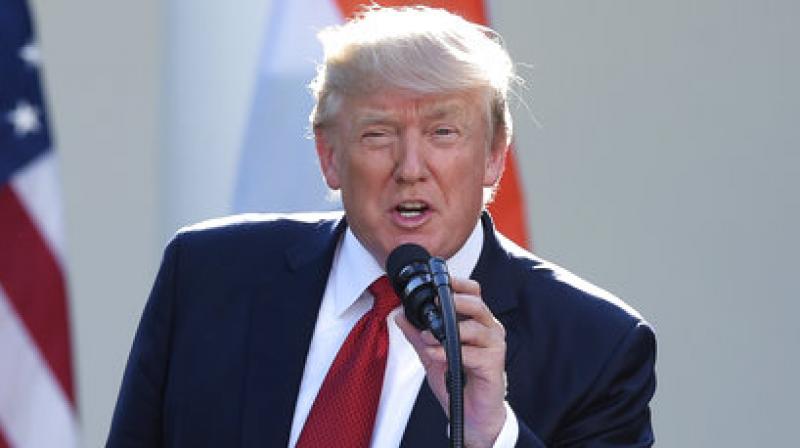With Alaska in North Korean range, few options for Donald Trump
But there are growing signs that Trump has already effectively given up on China's capability of reining in Kim's regime.

Washington: North Korea's test-firing of a missile apparently capable of reaching Alaska underlines the shrinking options for US President Donald Trump to halt Pyongyang's nuclear drive after losing faith in China's mediation efforts.
Shortly before his January inauguration as president, Trump said he would never let North Korea develop a nuclear weapon that would put parts of the United States in range, declaring on Twitter: "It won't happen!"
North Korea has just launched another missile. Does this guy have anything better to do with his life? Hard to believe that South Korea.....
— Donald J. Trump (@realDonaldTrump) July 4, 2017
But after Washington confirmed that North Korea had successfully tested an intercontinental ballistic missile (ICBM), experts say the US may have to accept that red line is close to being crossed if the missile system can be developed to carry a nuclear warhead. "The window for negotiating denuclearization is closed," Jeffrey Lewis, an expert in nuclear non-proliferation, said. "The big point is that we have to accept North Korea with a nuclear-armed ICBM."
In the immediate aftermath of the latest test, Trump again took to Twitter to berate the North's leader Kim Jong-Un and press China to "put a heavy move on North Korea and end this nonsense once and for all!"
....and Japan will put up with this much longer. Perhaps China will put a heavy move on North Korea and end this nonsense once and for all!
— Donald J. Trump (@realDonaldTrump) July 4, 2017
But there are growing signs that Trump has already effectively given up on China's capability of reining in Kim's regime, declaring last month that Beijing's efforts had not worked out.
The Trump administration's hardening stance was also illustrated last Thursday when it slapped sanctions on a Chinese bank linked to North Korea -- drawing an angry response from Beijing.
In a weekend phone call with China's president, Trump reportedly told Xi Jinping that Washington was prepared to act on its own in pressuring North Korea, according to the New York Times.
As well as leaning on China, Trump has also been seeing if he can work with South Korea's new leader Moon Jae-In, inviting him to the White House last week.
He has even tried to flatter Kim himself, calling him a "smart cookie" whom he would be "honored" to meet if only he would halt his missile programs. Adam Mount, a senior fellow at the Center for American Progress for Nuclear and Defense policy, said international pressure and diplomacy was of limited use now that Pyongyang was so far down the line.
"It is now illogical to apply pressure to prevent the threshold from being crossed. It has been crossed. Denuclearization is untenable," said Mount. "US policy failed. The best we can hope for now is to sustainably deter, contain, constrain, and reform the regime over the long term."
In the short term, the Pentagon is studying its options for military action, though the United States and South Korea quickly made a show of force following the ICBM test, firing missiles off the coast of the Korean peninsula in what Washington called a display of "precision fire capability." But US military chiefs have made clear they see enormous risks in a confrontation with the North.
Speaking in May, US Secretary of Defense James Mattis said any war with North Korea would be on a scale similar to the devastating Korea conflict in the 1950s. "The North Korean regime has hundreds of artillery cannons and rocket launchers within range of one of the most densely populated cities on Earth, which is the capital of South Korea," he told CBS News.
"The bottom line is, it would be a catastrophic war if this turns into a combat, if we're not able to resolve this situation through diplomatic means." Trump's National Security Adviser H.R. McMaster said in a speech last week that nothing had been ruled out but was blunt about the risks associated with any effort to impose a military solution.
"The president has directed us to prepare a range of options, including military options, that nobody wants to take," he said. Lewis, a researcher at the California-based Middlebury Institute for International Studies, said the Trump administration's focus should now be on dissuading North Korea from firing anything in earnest.
"We should consider ways to reduce tension while strengthening deterrence," said Lewis. "Ballistic missile defense might part of deterrence." The US has already installed parts of a missile defense system the Terminal High-Altitude Area Defense (THAAD) system in South Korea to guard against threats from the North.
But Moon has suspended further deployment following a furious campaign of economic sanctions and diplomatic protests by Beijing against the US missile shield, dealing a blow to Washington's regional security policy.

